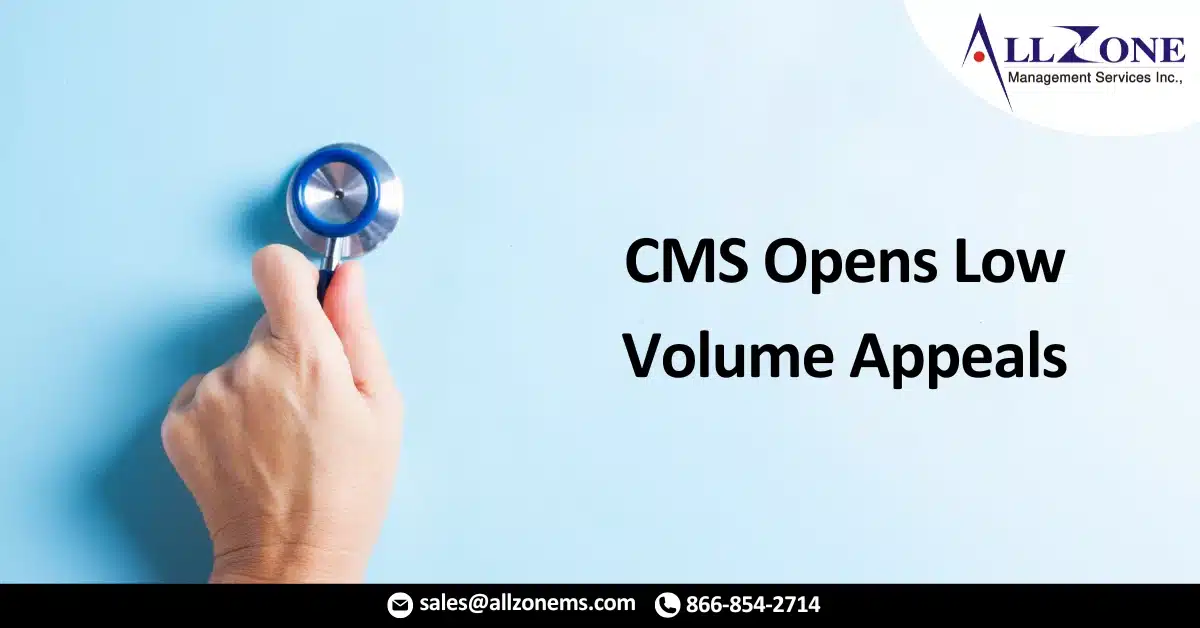Providers with claim denial challenges that are part of the growing Medicare appeals backlog can receive 62 percent of the billed amount under a new low volume appeals settlement from CMS.
February 07, 2018 – In the face of a growing Medicare appeals backlog, CMS opened the first round of a low volume appeals settlement on Feb. 5 for providers with less than 500 claim denial appeals stuck in the appeals backlog at the Office of Medicare Hearings and Appeals (OMHA) and the Medicare Appeals Council levels.
Under the settlement option, providers will receive a partial payment of 62 percent of the net approved amount of the appealed claim denial in exchange for removing all eligible claims from the appeals process.
The low volume appeals settlement is part of a larger attempt to reduce the Medicare appeals backlog. The Medicare appeals backlog reached over 607,000 pending cases at the administrative law judge level by June 2017 and the process took an average of almost three years, 11 times longer than the statutory deadline of 90 days.
Former HHS Secretary Tom Price added that the backlog is slated to increase to 950,500 pending cases by the end of the 2021 fiscal year.
A federal judge ordered HHS in December 2016 to reduce the backlog according to a schedule, with all pending cases resolved by Dec. 31, 2020.
HHS stated that the timeline was impossible to follow because the timeline would force the federal department to reimburse appeals regardless of merit, which violates the Medicare statute.
An appeals court revoked the timeline in August 2017, but HHS remains committed to alleviating the growing Medicare appeals backlog by offering a low volume appeals settlement.
An appeal is eligible for the low volume appeals settlement if:
- The appeal was pending at the OMHA and/or Council level as of Nov. 3, 2017
- The appeal has a total billed amount of $9,000 or less
- The appeal was filed properly and in a timely manner at the OMHA or Council level as of Nov. 3, 2017
- The claims included in the appeal were denied by a Medicare contractor and are still in a fully denied status in the Medicare system
- The claims included in the appeal were submitted for Medicare Part A or B reimbursement
- The claims included in the appeal were not part of an extrapolation
- The appeal was still at the OMHA or Council level of review as of the date the executed Administrative Agreement was fully executed
To apply for the low volume appeals settlement, providers need to submit an Expression of Interest form to CMS. Providers with National Provider Identifiers (NPIs) ending in an even number can now submit the form. CMS will accept the Expression of Interest forms until March 9, 2018.
f the settlement will launch on March 12, 2018, for providers with NPIs ending in odd numbers. CMS will accept Expression of Interest forms from odd-numbered NPI providers until April 11, 2018.
For providers with both even and odd numbered NPIs, CMS stated that providers will have to submit two Expression of Interest forms according to the round schedule.
Once CMS receives the Expression of Interest from providers, the federal agency will create a spreadsheet of potentially eligible appeals and associated claims. Providers must approve the spreadsheet and sign an administrative agreement listing the eligible appeals.
If providers want to modify the spreadsheet, they must submit an Eligibility Determination Request to add or remove appeals.
After both CMS and the provider finalize the agreement, the federal agency will direct Medicare Administrative Contractors (MACs) to total the claim amounts for appeals in the agreement. MACs will pay providers one payment per settlement agreement within 180 days of the federal agency’s signature on the agreement.
CMS noted that neither party will accept fault for the claim denial under the settlement option and the federal agency will not repay the costs to appeal claims denials.
The American Hospital Association (AHA) reported in 2016 that nearly half of hospitals spent over $10,000 on the just one component of the appeals process, while 27 percent spent over $25,000 and 5 percent spent over $100,000.
While providers cannot recoup those costs, CMS stated that the “settlement opportunity eliminates any further administrative expense.”
In addition to the low volume appeals settlement, HHS is also attempting to reduce the Medicare appeals backlog by expanding its Settlement Conference Facilitation program.
The Settlement Conference Facilitation program “is an alternative dispute resolution process at OMHA that gives certain providers and suppliers an opportunity to resolve their eligible Part A and Part B appeals.”

